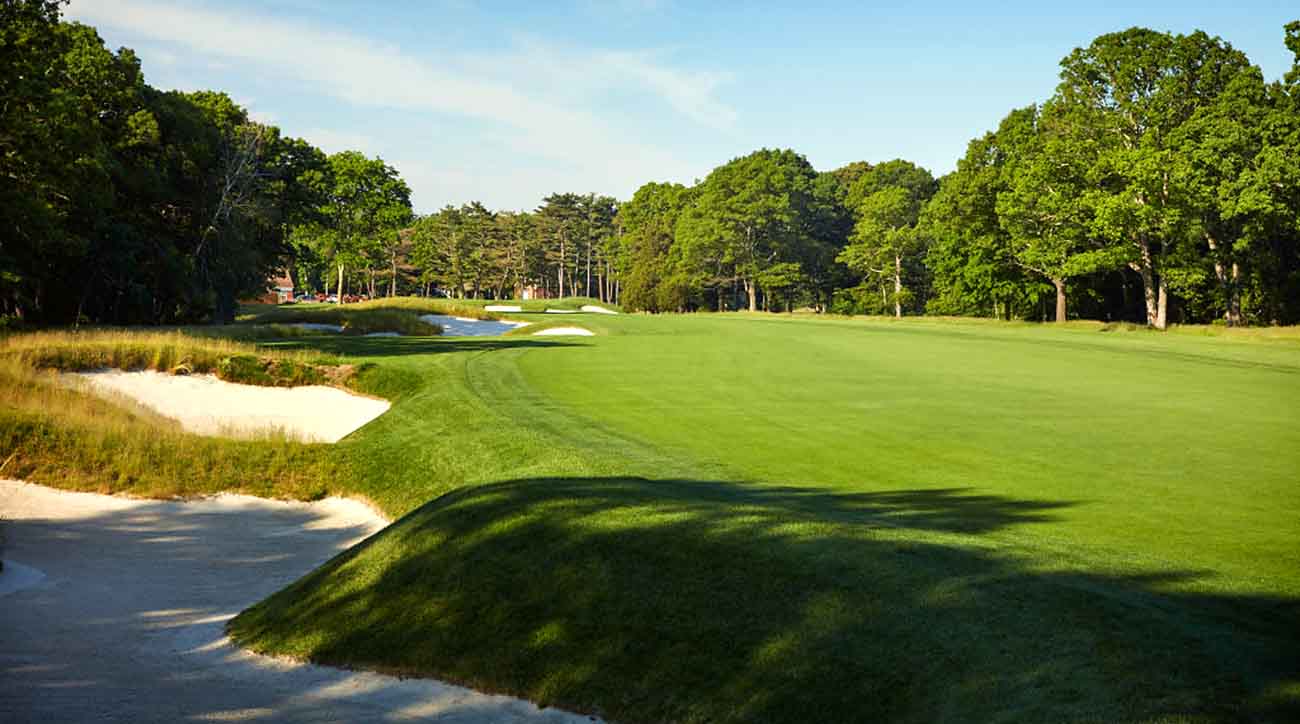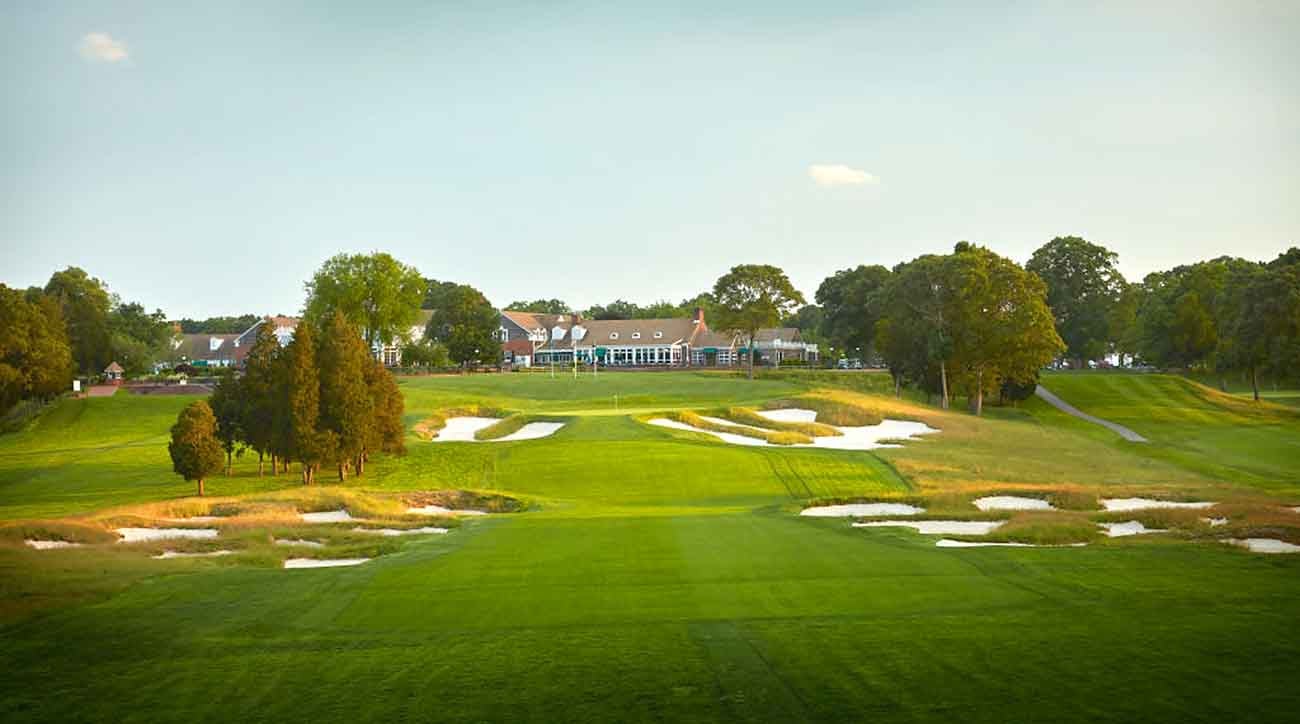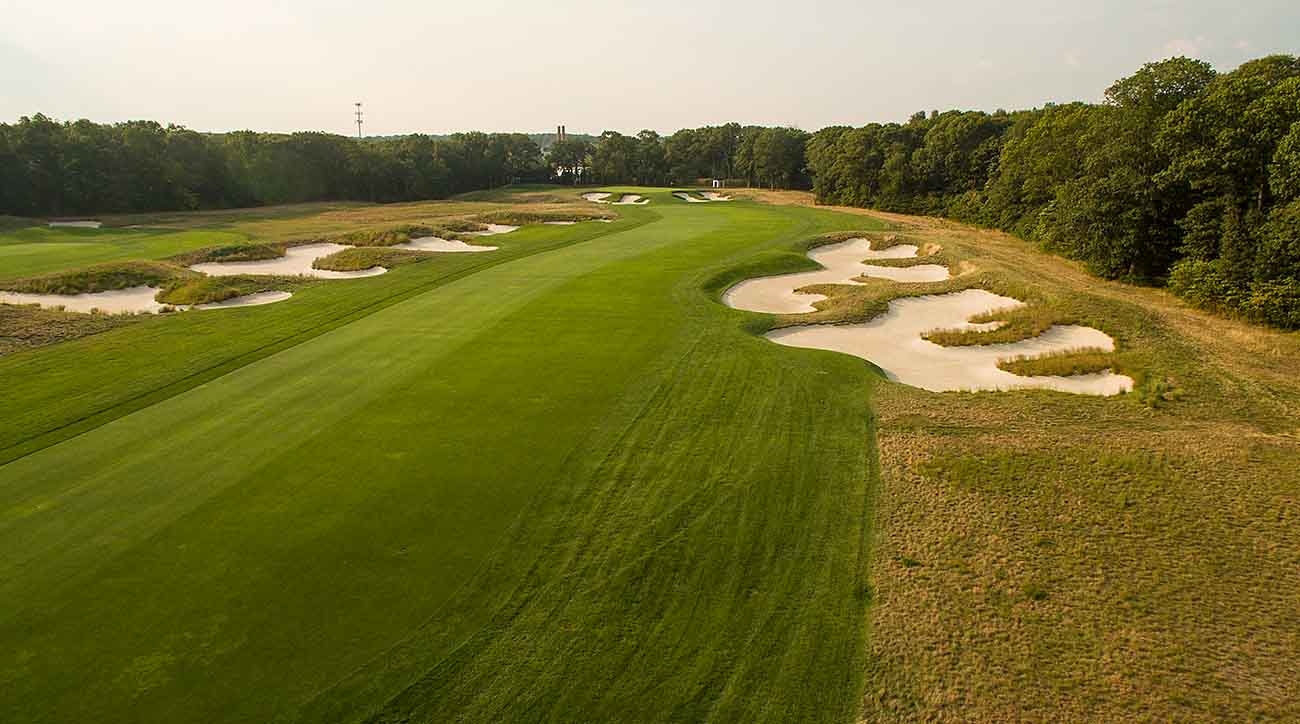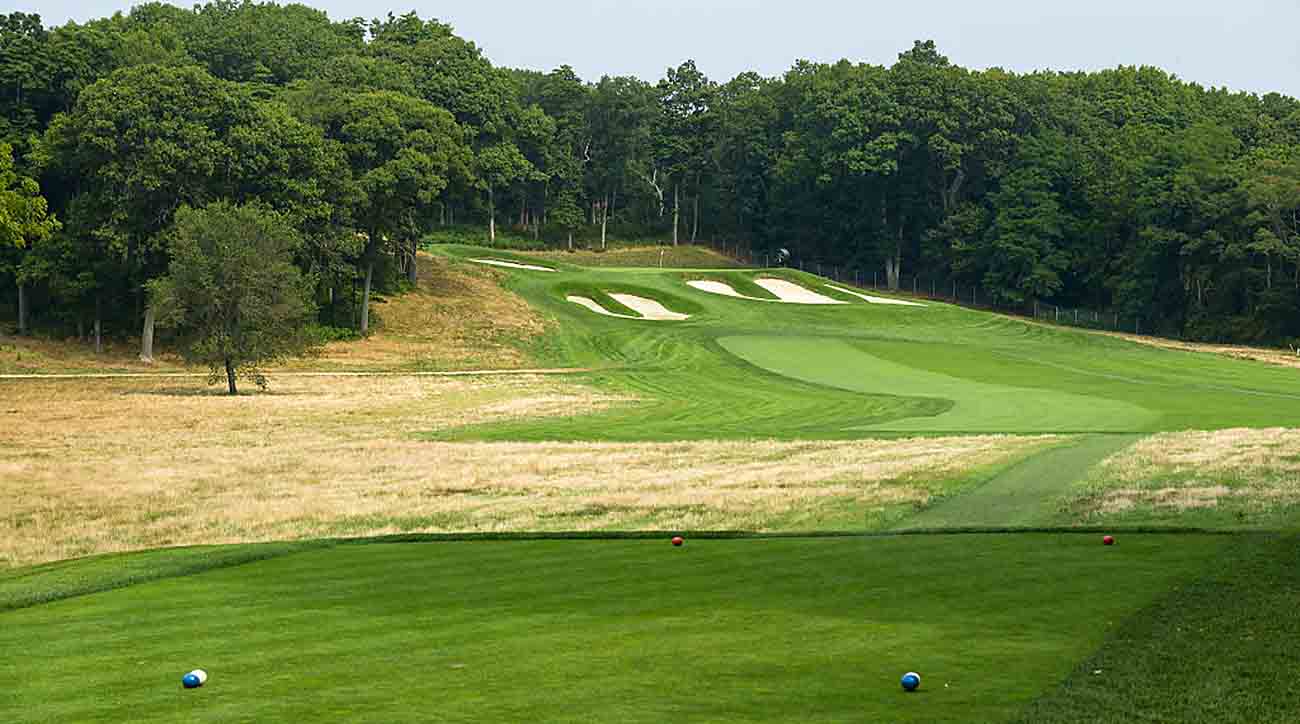PGA Championship: Nine things to know about Bethpage Black
1. TIGER’S TWO-FER?: In the last 50 years, only three players have won the first two majors of the year. Woods did it in 2002, when the first two majors were held at Augusta National and Bethpage Black. It was the only time in his career that he won the first two majors of the year.
He’ll be trying to replicate his Augusta-Bethpage double again this year.
Woods was at the height of his powers when he won the 2002 U.S. Open at Bethpage Black. It was his seventh win in his past 11 majors. By comparison, Arnold Palmer and Sam Snead won seven majors in their entire careers.
Woods finished at 3-under 277. He was the only player to finish under par on the 7,214-yard course, the longest in U.S. Open history.
“This was obviously the longest one, but it's also the narrowest U.S. Open I've ever played,” Woods said. “The widest fairway was 28 yards. And on top of that you had three holes about 490-plus as par-4s. That's not a whole lot of room to work with. And it just made for a very difficult test the entire week. You couldn't just slap it around and play poorly and contend in this championship. You had to play well.”
According to the Associated Press, Woods missed only two fairways in the final round and putted for birdie on 17 of the 18 holes.
Phil Mickelson finished in second place, three shots back. The 2002 U.S. Open remains the only major where Woods and Mickelson occupied the top two spots on the leaderboard.
Woods three-putted the first two holes and Mickelson birdied No. 1 to pull within two shots. Woods was bogey-free on the next 13 holes, though. He put the tournament away after reaching the par-5 13th in two shots with a 2-iron from 263 yards.
Mickelson was still seeking his first major in 2002. He was 0 for 40 in golf’s Grand Slam events. Bethpage Black was Mickelson’s seventh top-3 in a major and his third consecutive close call. He was runner-up at the 2001 PGA and finished third in the 2002 Masters.
The vocal New York fans tried to push Mickelson past Woods, but he was without peer in the early 2000s.“It was one of the most exciting days that I've had in the game of golf,” Mickelson said. “It was very electrifying, very similar to what the 99 Ryder Cup in Boston was. It was an incredible feeling, and a very exciting event to be a part of. And I could feel the electricity in the air.”
Woods was the first player since Jack Nicklaus in 1972 to win the first two majors of the year.
2. BACK IN BLACK: Woods finished T6 in his return to Bethpage Black seven years later.
Mickelson and Sergio Garcia are the only other players to finish in the top 10 in both U.S. Opens at Bethpage Black. Mickelson was second again in 2009.
He has a record six runners-up in the U.S. Open; Bethpage Black is the only course where he’s finished second multiple times.
Garcia, who played with Woods in the final group in 2002, finished fourth and T10 in the two U.S. Opens at Bethpage Black.
Garcia also finished T3 at the 2012 NORTHERN TRUST, making him the only player with three top-10s at Bethpage Black.
Players with multiple top-10s at Bethpage Black:
Sergio Garcia, 3
Tiger Woods, 2
Phil Mickelson, 2
Ryan Moore, 2
Ryan Moore finished T10 at the 2009 U.S. Open and T7 at the 2016 THE NORTHERN TRUST, the opening event of the FedExCup Playoffs. He is the only other player with multiple top-10s at Bethpage Black.
3. STROKES GAINED: It should be no surprise, then, that Woods, Mickelson and Garcia lead in Strokes Gained per round at Bethpage Black. Here’s a look at the leaders in that statistic, with a minimum of eight rounds at the course.
1. Tiger Woods, +2.90 per round
2. Sergio Garcia, +2.82
3. Phil Mickelson, +2.48
4. Ryan Moore, +1.91
5. Lee Westwood, +1.88
(Note: does not include amateur results)
Here are the players with the best Strokes Gained per round in the two NORTHERN TRUSTs (minimum six rounds).
T1. Dustin Johnson, +1.77
T1. Jason Day, +1.77
T3. Louis Oosthuizen, +1.65
T3. Rickie Fowler, +1.65
T3. Ryan Moore, +1.65
4. GROUNDBREAKING COURSE: Bethpage Black was a pioneer for public golf when it hosted the 2002 U.S. Open. It was the first truly public course to host a major.
Former USGA executive director David Fay is credited with the idea of bringing a major to a muni. In 1995, he visited Bethpage Black with about a dozen USGA associates. Rees Jones, the course architect known for renovating future Open sites, joined the group.
In Bethpage Black, they saw a course with great potential. It was worn down from hosting 45,000 rounds per year, though.
“There was very little grass on the tees, and the greens needed a lot of work,” Jones said. “Trees were growing in some bunkers. Other bunkers were abandoned.”
Torrey Pines’ South Course and Chambers Bay followed in Bethpage’s footsteps as municipal courses to host the U.S. Open.
Woods, who grew up on a Navy golf course in Southern California, took pride in winning the first U.S. Open conducted on a municipal golf course.
“For those of us who grew up on public courses, this is awesome to win,” Woods said.
5. TOUGH TEST: The famous sign on Bethpage Black’s first tee will get plenty of airtime this week. That is a guarantee. “The Black Course Is An Extremely Difficult Course Which We Recommend Only For Highly Skilled Golfers,” it reads in black type juxtaposed against a white background.
The course isn’t difficult just for amateur golfers, though. It tests the best players in the world.
The winning score at Bethpage Black has never been lower than 274.
Nick Watney, who won THE NORTHERN TRUST at Bethpage in 2012, is the only player to finish double-digits under par. He and 2016 NORTHERN TRUST champion Patrick Reed are the only players to shoot lower than 276. Bethpage Black played as a par-71 in THE NORTHERN TRUST and a par-70 in U.S. Opens, when the par-5 seventh was a par-4.
“It likes to be known as one of the hardest courses you’ve ever played. It’s always been like that,” said one local. “It wants you to walk off there out of breath.”
It played about three-quarters of a stroke over par both times it hosted THE NORTHERN TRUST. It should be no surprise that it was the hardest course on TOUR both times it hosted the U.S. Open.
The U.S. Opens at Bethpage Black were won with scores of 277 and 276.
“It’s big, it’s long, it has huge bunkers. It’s just tough. It’s right-in-front-of-you difficult,” said former PGA champion Keegan Bradley, who played Bethpage while attending St. John’s University.
6. ALL-AMERICAN: Americans have won all four events at Bethpage Black. Watney and Reed won THE NORTHERN TRUST, while Lucas Glover and Woods were the U.S. Open winners.
Glover finished at 4-under 276 (69-64-70-73) to finish two shots ahead of Mickelson, Ricky Barnes and David Duval. It was Duval’s first-top-10 since the 2001 TOUR Championship.
Barnes set a U.S. Open record by shooting 132 (67-65) in the first two rounds. He entered the final round with a one-shot lead over Glover, who was four shots ahead of third place.
Heavy rains hit Long Island that week and caused a large disparity in scoring between the two sides of the draw. The half of the field that teed off Thursday morning averaged 147.6 strokes in the first two rounds, compared to 144.6 for the players who teed off Thursday afternoon. That side of the draw avoided the rain and played under mostly sunny skies.
Woods was the only player from his side of the draw to finish in the top eight.
Glover, who last won in 2011, is 27th in this year’s FedExCup standings. He has 11 top-25s in 15 starts this season.
7. ROUGH STUFF: Don’t expect the same brawny Bethpage Black that we saw in the two U.S. Opens, though.
The PGA Championship doesn’t seek to offer the same severe test that the U.S. Open hopes to provide. Also, with temperatures not forecast to get above 65 degrees this week, it’s hard to grow the same thick rough that is on display at U.S. Opens.
“If we’re going to get everybody to think this is going to be knee-high rough for a PGA Championship, I promise you, it’s not going to look anything like it did for those two (U.S. Opens),” CBS announcer Jim Nantz said in a pre-tournament press conference.
Rory McIlroy said at last week’s Wells Fargo Championship that he expects Bethpage Black to have a similar setup to a regular PGA TOUR stop. He finished T31 and T24 at Bethpage Black during the FedExCup Playoffs. McIlroy finished T10 in the 2009 U.S. Open, his first.
“I would assume Bethpage is going to feel like a normal PGA TOUR setup,” McIlroy said. “You're not really going to have to do anything differently.”
Kerry Haigh, who is in charge of the PGA of America’s setups, expects the rough to be between 3 ½ and 4 inches long. The fairway widths will be similar to the 2009 U.S. Open.
The only exception will be on the hourglass-shaped fairway of the 411-yard 18th. Parts of that fairway have been widened to give players more option.
“I think there will be certainly more of a premium on driving than some other venues due to the fairways and due to the health of the rough,” Haigh said.
8. STATS SUGGEST: In 2016, Bethpage Black had the seventh-highest proximity from the rough (46 feet, 10 inches). It had the third-highest rough proximity from 150-175 yards and 175-200 yards, as well.
Rough proximity from 150-175 yards (2016)
1. East Lake GC: 49 feet, 4 inches
2. Torrey Pines (South): 49 feet
3. Bethpage Black: 47 feet, 5 inches
Rough proximity from 175-200 yards (2016)
1. Torrey Pines (South): 65 feet, 8 inches
2. TPC Deere Run: 62 feet, 2 inches
3. Bethpage Black: 59 feet, 11 inches
Avoiding Bethpage Black’s deep greenside bunkers will be important, as well.
Players got up-and-down less than half the time from the sand at the 2016 NORTHERN TRUST. The average proximity from the bunkers of 10 feet, 1 inch was the 10th-highest of the season.
Bethpage Black’s main challenge is from tee to green, because once players get on the greens they will find relatively flat putting surfaces with subtle slopes.
Hitting greens from the rough was one of the ways Woods was able to separate himself from his competition during his best years. It’s a big reason for his success at places like Firestone and Torrey Pines. And it should come in handy at the PGA Championship.
Woods has hit 75.6% of his greens this season, tops on TOUR. He led the field in greens hit when he won the 2002 U.S. Open, as well.
He hit 53 greens that week, five more than anyone else in the field. That’s 74% of the greens on a week when the field hit just 51%. He was seventh in both driving accuracy and driving distance, as well.
He was 11th in greens hit in the 2009 U.S. Open. His 101 greens hit are the most in the two U.S. Opens at Bethpage Black.
Most greens hit in U.S. Opens at Bethpage Black:
1. Tiger Woods, 101
2. Kenny Perry, 96
3. Phil Mickelson, 92
4. Vijay Singh, 91
5. Sergio Garcia, 90
He’s also hit the highest percentage of greens in the U.S. Opens at Bethpage Black (minimum six rounds):
1. Tiger Woods, 70.1%
2. Robert Allenby, 68.5%
T3. Kenny Perry, 66.7%
T3. Lucas Glover, 66.7%
5. Phil Mickelson, 63.9%
It’s been a decade since the last major championship at Bethpage Black. The two FedExCup Playoffs events can give a more recent look at how players performed at Bethpage Black.
Here’s the highest percentage of greens hit in THE NORTHERN TRUST at Bethpage (minimum six rounds):
1. J.B. Holmes, 71.5%
T2. Bubba Watson, 70.8%
T2. Adam Scott, 70.8%
T2. Rory McIlroy, 70.8%
5. Webb Simpson, 70.4%
The two Playoffs events also allow us to use Strokes Gained data to analyze players’ performance.
Here’s the players with the highest Strokes Gained: Approach at Bethpage Black (minimum 4 rounds):
1. Nick Watney, +1.71
2. Kevin Na, 1.65
3. Gary Woodland, +1.61
4. Lee Westwood, +1.54
5. Jason Kokrak, +1.51
6. Patrick Reed, +1.48
7. Adam Scott, +1.42
8. Jordan Spieth, +1.37
9. Bubba Watson, +1.29
10. Justin Thomas, +1.08
9. ON A ROLL: Bethpage Black’s main challenge is from tee to green, because once players get on the greens they will find relatively flat putting surfaces.
“The greens are subtle and you feel like you can make putts on them,” Mickelson said in 2002. “When we get to greens this speed, I’m used to seeing a lot more break in them.”
Haigh said the flat greens give the PGA of America the opportunity to ratchet up the green speeds.
“Two or three greens have some significant moment,” he said. “The rest of the greens have more gentle movement, more subtle movement, which we allow for possibly quick speed of greens, will be probably pretty quick.”














